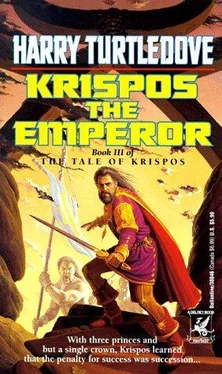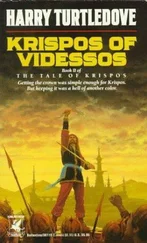Harry Turtledove - Krispos the Emperor
Здесь есть возможность читать онлайн «Harry Turtledove - Krispos the Emperor» весь текст электронной книги совершенно бесплатно (целиком полную версию без сокращений). В некоторых случаях можно слушать аудио, скачать через торрент в формате fb2 и присутствует краткое содержание. Жанр: Старинная литература, на английском языке. Описание произведения, (предисловие) а так же отзывы посетителей доступны на портале библиотеки ЛибКат.
- Название:Krispos the Emperor
- Автор:
- Жанр:
- Год:неизвестен
- ISBN:нет данных
- Рейтинг книги:4 / 5. Голосов: 1
-
Избранное:Добавить в избранное
- Отзывы:
-
Ваша оценка:
- 80
- 1
- 2
- 3
- 4
- 5
Krispos the Emperor: краткое содержание, описание и аннотация
Предлагаем к чтению аннотацию, описание, краткое содержание или предисловие (зависит от того, что написал сам автор книги «Krispos the Emperor»). Если вы не нашли необходимую информацию о книге — напишите в комментариях, мы постараемся отыскать её.
Krispos the Emperor — читать онлайн бесплатно полную книгу (весь текст) целиком
Ниже представлен текст книги, разбитый по страницам. Система сохранения места последней прочитанной страницы, позволяет с удобством читать онлайн бесплатно книгу «Krispos the Emperor», без необходимости каждый раз заново искать на чём Вы остановились. Поставьте закладку, и сможете в любой момент перейти на страницу, на которой закончили чтение.
Интервал:
Закладка:
Oxeites had the congregation repeat the creed with him one lust time, then motioned for the worshipers to be seated. Phostis almost left the High Temple before the patriarch began his sermon. Sermons, being by their nature individual and specific, took him out of the sense of belonging he sought from worship. But since he had nowhere to go except back to the palaces, he decided to stay and listen. Not even his father could rebuke him for piety.
The ecumenical patriarch said. "I would like to have all of vou gathered together with me today pause for a moment and contemplate the many and various ways in which the pursuit of wealth puts us in peril of the eternal ice. For in acquiring great stores of gold and gems and goods, we too easily come to consider their accumulation an end in itself rather than a means through which we may provide for our own bodily survival and prepare a path for our progeny."
Our progeny? Phostis thought, smiling. The Videssian clergy was celibate; if Oxeites was preparing a path for his progeny, he had more sins than greed with which to concern himself.
The patriarch continued, "Not only do we too readily value goldpieces for their own sake, those of us who do gain riches, whether honestly or no, often also endanger ourselves and our hope of joyous afterlife by grudging those who lack a share, however small, of our own good fortune."
He went on in that vein for some time, until Phostis felt ashamed to have a belly that was never empty, shoes on his feet, and thick robes and hypocausts to warm him through the winter. He raised his eyes to the Phos in the dome and prayed to the lord with the great and good mind to forgive him his prosperity.
But as his gaze descended from the good god to the ecumenical patriarch, he suddenly saw the High Temple in a new, disquieting light. Till this moment, he'd always taken for granted the flood of goldpieces that had been required to erect the Temple in the first place and the further flood that had gone into the precious stones and metals that made it the marvel it was. If those uncounted thousands of goldpieces had instead fed the hungry, shod the barefoot, clothed and warmed the shivering, how much better their lot would have been!
He knew the temples aided the poor; his own father told and retold the story of spending his first night in Videssos the city in the common room of a monastery. But for Oxeites, who wore cloth-of-gold, to urge his listeners to give up what they had to aid those who had not struck Phostis as nothing less than hypocrisy. And worse still, Oxeites himself seemed to have no sense of that hypocrisy.
Anger drove shame from Phostis. How did the ecumenical patriarch have the crust to propose that others give up their worldly goods when he said not a word about those goods the temples owned? Did he think they somehow acquired immunity from being put to good use—being put to the very use he himself advocated—because they were called holy?
By the tone of his sermon, he very likely did. Phostis tried to understand his way of thinking, tried and failed. The junior Avtokrator again glanced up toward the famous image of Phos. How did the lord with the great and good mind view calls to poverty from a man who undoubtedly possessed not just one but many sets of regalia, the value of any of which could have supported a poor family for years?
Phostis decided the good god would set down grim words for Oxeites in his book of judgment.
The patriarch kept preaching. That he did not realize the contradiction inherent in his own views irked Phostis more with every word he heard. He hadn't enjoyed the courses in logic Krispos ordained for him, but they'd left their mark. He wondered if next he would hear a raddled whore extolling the virtues of virginity. It would, he thought, be hardly less foolish than what he was listening to now.
"We bless thee, Phos, lord with the great and good mind, by thy grace our protector, watchful beforehand that the great test of life may be decided in our favor," Oxeites proclaimed for the last time. Even without his robes, he would have been tall and slim and distinguished, with a pure white beard and silky ryebrows he surely combed. When he wore the patriarchal vestments, he seemed to the eye the very image of holiness. But his words rang hollow in Phostis' heart.
Most of the worshipers filed out of the High Temple after the liturgy was over. A few, though, went up to the ecumenical patriarch to congratulate him on his sermon. Phostis shook his head, bemused. Were they deaf and blind, or merely out to curry favor? Either way, Phos would judge them in due course.
As he walked down the steps from the Temple to the surrounding courtyard, Phostis turned to one of his guardsmen and said, "Tell me, Nokkvi, do you Halogai house your gods no richly in your own country?"
Nokkvi's ice-blue eyes went wide. He threw back his head and boomed laughter; the long blond braid he wore bounced up and down as his shoulders shook. When he could speak again, he answered, "Young Majesty, in Halogaland we have not so much for ourselves that we can give our gods such spoils as you fashion for your Phos. In any case, our gods care more for blood than for gold. There we feed them well."
Phostis knew of the northern gods' thirst for gore. The holy Kveldulf, a Haloga who came to revere Phos, was reckoned a martyr in Videssos: his own countrymen had slaughtered him when he tried to convert them to worshiping the lord with the great and good mind. Indeed, the Halogai would have been far more dangerous foes to the Empire did they not incessantly shed one another's blood.
Nokkvi stepped down on the flat flagstones of the courtyard. When he turned to look back at the High Temple, his gaze went wolfish. He said, "I tell you this, too, young Majesty: let hut a few shiploads full of my folk free to reive in Videssos the city, and your god, too, will know less of gold and more of blood. Maybe that savor will better satisfy him."
Phostis gestured to turn aside the northerner's words. The Empire was still rebuilding and repeopling towns that Harvas' Halogai had sacked around the time he was born. But even having such a store of riches here in the imperial capital was a temptation not just to the fierce barbarians from the north, hut also to avaricious men within the Empire. Any store of riches was such, in fact.
He stopped, his mouth falling open. All at once, he began to understand how the Thanasioi came by their doctrines.
The great bronze valves of the doorway to the Grand Courtroom slowly swung open. Seated on the imperial throne, Krispos got a sudden small glimpse of the outside world. He smiled; the outside world seemed only most distantly connected to what went on here.
He sometimes wondered whether the Grand Courtroom wasn't even more splendid than the High Temple. Its ornaments were less florid, true, but to them was added the everchanging spectacle of the rich robes worn by the nobles and bureaucrats who lined either side of the colonnade leading from the bronze doors to Krispos' throne. The way between the two columns was a hundred yards of emptiness that let any petitioner think on his own insignificance and the awesome might of the Avtokrator.
In front of the throne stood half a dozen Haloga guardsmen in full battle gear. Krispos had read in the histories of previous reigns that one Emperor had been assassinated on the throne and three others wounded. He did not aim to provide similarly edifying reading for any distant successor.
A herald, distinguished by a white-painted staff, had his place beside the northerners. He took one step forward. The courtiers left off their own chattering. Into the silence, the herald said, "Tribo, the envoy from Nobad, son of Gumush, the khagan of Khatrish, begs leave to approach the Avtokrator of the Videssians." His trained voice was easily audible from one end of the Grand Courtroom to the Other.
Читать дальшеИнтервал:
Закладка:
Похожие книги на «Krispos the Emperor»
Представляем Вашему вниманию похожие книги на «Krispos the Emperor» списком для выбора. Мы отобрали схожую по названию и смыслу литературу в надежде предоставить читателям больше вариантов отыскать новые, интересные, ещё непрочитанные произведения.
Обсуждение, отзывы о книге «Krispos the Emperor» и просто собственные мнения читателей. Оставьте ваши комментарии, напишите, что Вы думаете о произведении, его смысле или главных героях. Укажите что конкретно понравилось, а что нет, и почему Вы так считаете.












